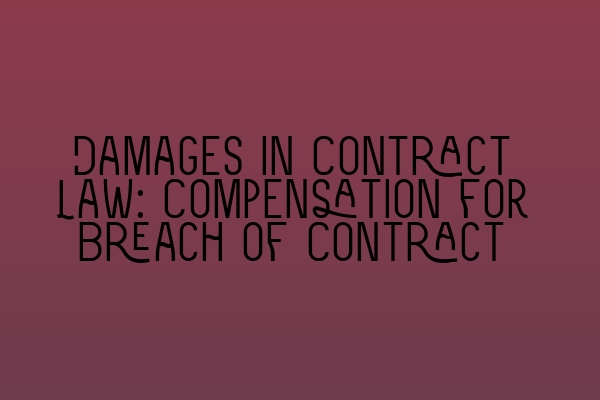Damages in Contract Law: Compensation for Breach of Contract
When entering into a contract, both parties expect that their obligations will be fulfilled as agreed upon. However, there are times when one party fails to perform their duties, resulting in a breach of contract. In such cases, the non-breaching party is entitled to seek compensation for the losses suffered due to the breach. This compensation, known as damages, aims to put the injured party in the same position they would have been in if the contract had been performed.
In this article, we will delve into the concept of damages in contract law, exploring the types of damages available, the principles governing their assessment, and the factors considered by courts when awarding damages. Understanding these aspects of damages is essential for both solicitors who handle breach of contract cases and individuals seeking compensation for breach of contract.
Types of Damages
There are various types of damages that can be awarded in a breach of contract case, depending on the circumstances and nature of the breach. The two primary types of damages in contract law are:
1. Compensatory Damages
Compensatory damages, also known as actual damages, aim to compensate the non-breaching party for the losses they have incurred as a result of the breach of contract. These damages are designed to place the injured party in the position they would have been in if the contract had been fully performed. Compensatory damages can include:
- Expectation Damages: These damages aim to compensate the injured party for the loss of their expected benefits under the contract. It includes direct damages, such as lost profits, as well as consequential damages, which are the foreseeable losses resulting from the breach.
- Reliance Damages: In some cases, the injured party may opt for reliance damages instead of expectation damages. Reliance damages aim to reimburse the injured party for any expenses or losses incurred in reliance on the contract. This can include costs associated with preparing for the performance of the contract.
2. Liquidated Damages
Liquidated damages are a predetermined amount of damages specified in the contract itself. The parties agree to this amount as the measure of compensation in the event of a breach. Liquidated damages are often used when calculating the actual losses in case of breach would be difficult or uncertain. However, it is essential to ensure that liquidated damages are a genuine pre-estimate of loss and not a penalty, as penalties are unenforceable under contract law.
Principles Governing Assessment of Damages
When assessing damages in a breach of contract case, there are several principles that courts consider:
- Causation: The injured party must establish that the losses suffered were caused by the breach of contract. There must be a direct link between the breach and the damages claimed.
- Foreseeability: Damages can only be awarded for losses that were reasonably foreseeable at the time of contract formation. The breaching party must have had knowledge or should have had knowledge of the potential consequences of their breach.
- Mitigation: The non-breaching party has a duty to mitigate their losses. This means that they must take reasonable steps to minimize the damages once they become aware of the breach. Failure to mitigate may result in a reduction of the damages awarded.
Factors Considered in Awarding Damages
When determining the amount of damages to be awarded, courts take into account various factors, including:
- Direct Losses: The court considers the direct losses suffered by the non-breaching party, such as financial loss, lost profits, and additional expenses.
- Consequential Losses: Consequential losses, also known as indirect or special damages, refer to losses that are not directly caused by the breach but are a foreseeable consequence of the breach. These can include reputational damages or loss of future business opportunities.
- Availability of Substitute Performance: If the injured party is able to obtain substitute performance from another source, the court may reduce the damages awarded. The non-breaching party should make reasonable efforts to mitigate their losses.
- Certainty: The court requires a reasonable degree of certainty in establishing the amount of damages. The injured party must provide evidence to support their claim and demonstrate the extent of their losses.
Navigating the complexities of damages in contract law can be challenging. It is advisable to seek guidance from a qualified solicitor who specializes in contract law to ensure you receive the appropriate compensation for a breach of contract.
For more information on legal challenges and pitfalls in practice, refer to our article on Navigating Legal Challenges and Pitfalls in Your Practice.
To understand the difference between a barrister and a solicitor, read our comprehensive comparison article on Barrister vs. Solicitor: A Comprehensive Comparison.
For solicitors interested in understanding the SRA Competence Statement, we have provided a guide on it that can be found at Understanding the SRA Competence Statement: A Guide for Solicitors.
Exploring different solicitor specializations? Find your niche with our informative article on Exploring Different Solicitor Specializations: Finding Your Niche.
Considering pursuing a career in law? Check out our recommendations for the top law schools in the UK at Top Recommendations for Law Schools in the UK.
